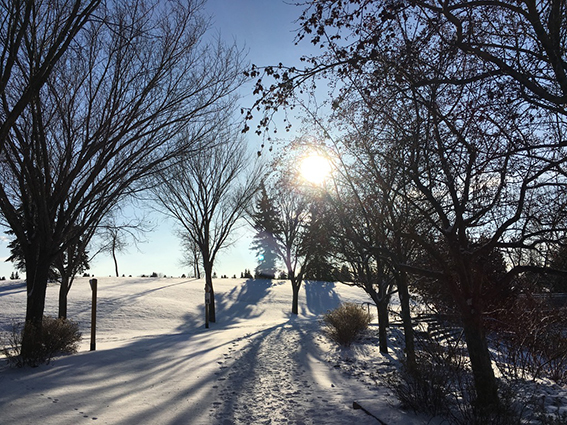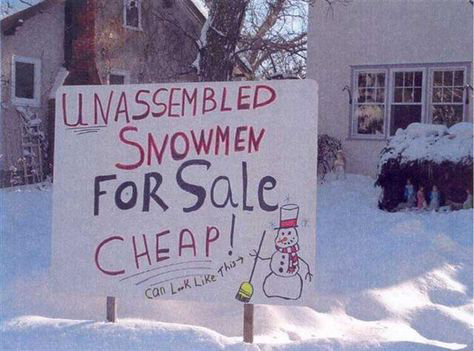
We got the call on Monday. Our grandkids needed a lift. It was a “snow day.” The school board had cancelled bus transportation, but with the schools still open, we were on deck to drive three of them to school. So, when we arrived, it was the wintertime routine of organizing boots, snow jackets, snow pants, hats and gloves. If you recall, despite the snowfall, that morning dawned sunny, so we got the usual…
“We don’t need snow pants,” they said. “Look how sunny it is!”
“It’s deceiving,” I said. And I thought to myself, “Does any kid understand what ‘deceiving’ means? Not likely.”
Anyway, I unwisely resorted to seniority. “Snow pants on because I say so.” I suppose I could have used statistics to make my point: “Do you know that more than 30 people died in Switzerland in avalanches last winter?” Not many avalanches around here, come to think of it.
Or, how about: “In 2016, there were 3.6 times the total deaths in the snow than all other hazards combined.” Do I even understand what that means? No. Maybe don’t use statistics. Try an anecdote-based means to prove that winter is more dangerous than it looks, that it’s, ah, deceptive.
Part of my rationale for snow being deceptive, comes from personal experience. Not a very good experience. Back in the 1970s, when my wife and I shared residence with her sister and husband, out in the Saskatchewan countryside, we all lived in a farmhouse about a half-hour’s drive west of Saskatoon. Normally, that half-hour drive was picturesque, peaceful, never threatening … until winter.
 Winter in Saskatchewan is – shall I put it nicely – unique. It’s sparked such euphemisms as, “It’s so cold, I had to chisel my dog off a fire hydrant.” Or, the picture of a Saskatchewan snowbank with a sign stuck in it: “Unassembled snowmen for sale. Cheap!” Anyway, during my first winter outside Saskatoon, I had one rule drilled into my head:
Winter in Saskatchewan is – shall I put it nicely – unique. It’s sparked such euphemisms as, “It’s so cold, I had to chisel my dog off a fire hydrant.” Or, the picture of a Saskatchewan snowbank with a sign stuck in it: “Unassembled snowmen for sale. Cheap!” Anyway, during my first winter outside Saskatoon, I had one rule drilled into my head:
“If you skid off the road in winter here on the Prairies,” they warned me, “under no circumstances, should you leave your car!”
Well, one night, driving that stretch west of Saskatoon, I turned north off the highway onto a sideroad in my truck, a truck with four-wheel-drive, I might add, but in those winter conditions even all-wheel drive doesn’t make much difference. Well, that trip home, steering at night along an unlit road through blowing snow where the shoulders disappeared into snowdrifts that disappeared into the horizons gobbled up by the night.
Before long I’d slid off the road in snow up to the hood. No matter what I did – use low gear, shift back and forth, shovel away snow behind the wheels – nothing worked. I was stuck. And there I sat, in hopes either somebody might come along, or my being overdue at the farmhouse might spark some curiosity (in fact, everybody’d gone to bed). After trying everything, I got back in the truck and thought what to do next. And that prairie mantra repeated in my head: “Under no circumstances, should you leave your car!”
But when I looked through the snow, I could see lights, and they looked close enough. “Lights on the Prairies are deceptively close…” somebody had told me. Yes, but I know this road. Those lights were maybe half a kilometre away. I can get there in five or 10 minutes. Yes, but it’s minus-25 (minus-35 with the wind chill) out there. Damn it! I’d been sitting there over an hour and though the truck was still running, the gas tank was nearly empty.
I’m going to make a dash for it for those farm lights. Well, it took me nearly 30 minutes to make it that far. I was nearly frozen. But the family was there and answered my banging on the door. And they called my family to come and pick me up. I came as close as to disappearing into a snowdrift, succumbing to frostbite in the wind chill, or freezing to death on a doorstep where nobody was home, as I care to admit. In every way, the conditions were deadly deceptive.
Perhaps wisely I chose not to tell the grandkids about my off-road winter experience the other morning. At least not yet. Actually, my convincer was as plain as the nose on our nearly frozen faces. One of the grandkids, that morning, was returning the classroom hamster after taking care for it over the weekend. Dutifully, our grandson had a blanket over the hamster cage, to keep “Olive” warm. I could have told them, “See, the hamster’s got a winter covering on. So should you.”
And if I’d told the kids about my dumb dash through a prairie snowdrift in the 1970s, they’d have correctly told me that Olive the hamster has more brains than I did. And on that night’s misadventure, they’d be right.